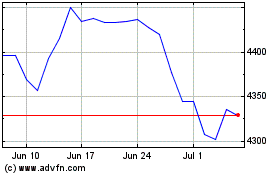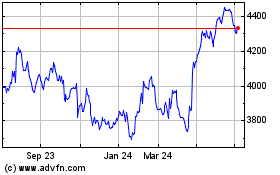Slow increase in sales puts pressure on new CEO as competition
in U.S. market intensifies
By Saabira Chaudhuri
This article is being republished as part of our daily
reproduction of WSJ.com articles that also appeared in the U.S.
print edition of The Wall Street Journal (December 18, 2019).
LONDON -- Unilever PLC warned it would miss its sales target for
the year, blaming difficulties in the U.S. and other key markets
and setting up an early challenge for Chief Executive Alan Jope,
less than a year in the top job.
The owner of Dove body wash and Ben & Jerry's ice cream said
sales growth on an underlying basis -- which strips out currency
and acquisition impacts -- would be below its guidance of 3% to 5%
this year and at the low end of that range in 2020. Earnings,
margin and cash aren't expected to be affected, it said.
Unilever's American depostary receipts fell 9.1% Tuesday in New
York.
Unilever has struggled with slow growth and fierce competition
in North America -- its biggest market by sales -- where volumes
declined in the third quarter. On Tuesday the company said it was
also facing challenges in India and West Africa.
The company has been battling competition in the U.S. from
Procter & Gamble Co. in categories such as shampoo. P&G,
which makes Tide detergent and Bounty paper towels, has invested in
product quality, packaging, marketing and retail execution.
Unilever also faces a challenge from a growing number of nimble,
local brands fueled by the move to online shopping. Unilever said
in February that 6,000 new brands had cropped up across six of its
markets for beauty and personal care over the past two years.
While the company said there were "early signs of improving
performance" in North America, it warned a full recovery would take
time.
RBC analyst James Edwardes Jones estimated the figures imply the
company's lowest quarterly sales growth for more than a decade and
said Unilever must increase investment.
"This is what happens when a company cuts marketing, while its
competitors are increasing theirs," he said.
Mr. Jope, on a call with reporters, said Unilever was
accelerating its cost-savings plan to fund greater investment in
its business, and that it would also consider selling slow-growing
units.
While he didn't specify, analysts have long suggested the
company might look to sell some food brands. Rival Nestlé SA, after
missing sales targets for several quarters, has sharpened its focus
on high-growth categories such as coffee and pet food, while
leaving slower-growth businesses such as U.S. confectionery, a
strategy that is paying off.
Mr. Jope also said the company was working to attract new
consumers to its brands and come up with new products. He said
investments in U.S. ice cream, hair care and dressings -- lately
problem categories in America -- had already started to pay
off.
"We are far from crisis conditions," he said. "This is just a
little bit more turbulent than normal."
Unilever has also shuffled top management as part of its efforts
to jump-start sales.
Unilever this month said it was replacing its North America head
with the former chief executive of Revlon Inc. That followed the
naming of a new chairman and new beauty and personal care head this
year.
However, having new faces "leaves some uncertainty over the
approach and plans at the group," wrote analysts at Société
Générale in a recent note. "Investors we speak to are increasingly
uneasy about an opaqueness of what Unilever thinks it can achieve
in the medium term and what is changing to get that delivered."
Some analysts have also expressed concern that Mr. Jope, a
marketeer by training who took over in January, would be less
focused on financials than his predecessor Paul Polman.
"CEO Alan Jope is more enthusiastic talking about
sustainability, digital and the talent agenda than the nuts and
bolts of growth drivers, cost savings and portfolio choices," wrote
Jefferies analyst Martin Deboo in a recent note.
A Unilever spokesman declined to comment on recent analyst
remarks.
At the same time, others have welcomed Mr. Jope's indication
that Unilever will pull back on acquisitions. Under Mr. Polman,
Unilever made a string of small buys to boost exposure to
high-growth categories, but growing those has proved difficult.
Aside from challenges in North America, the company is also
grappling with an economic slowdown in India -- its largest market
by volume. Cash shortages in rural areas along with a combination
of flooding and droughts over the monsoon season have hindered
demand. Growth is currently trending at less than 5%, down from
about 10% last year, Mr. Jope said Tuesday.
The company also flagged West Africa as a problem area. In
Nigeria and Ghana -- Unilever's two largest markets in the region
-- Mr. Jope said the company is facing "a double whammy" of slowing
demand and disruptions to distribution.
Corrections & Amplifications An earlier version of the chart
with this article misspelled Procter & Gamble as Proctor &
Gamble. (Dec. 17, 2019)
Write to Saabira Chaudhuri at saabira.chaudhuri@wsj.com
(END) Dow Jones Newswires
December 18, 2019 02:47 ET (07:47 GMT)
Copyright (c) 2019 Dow Jones & Company, Inc.
Unilever (LSE:ULVR)
Historical Stock Chart
From Mar 2024 to Apr 2024

Unilever (LSE:ULVR)
Historical Stock Chart
From Apr 2023 to Apr 2024
